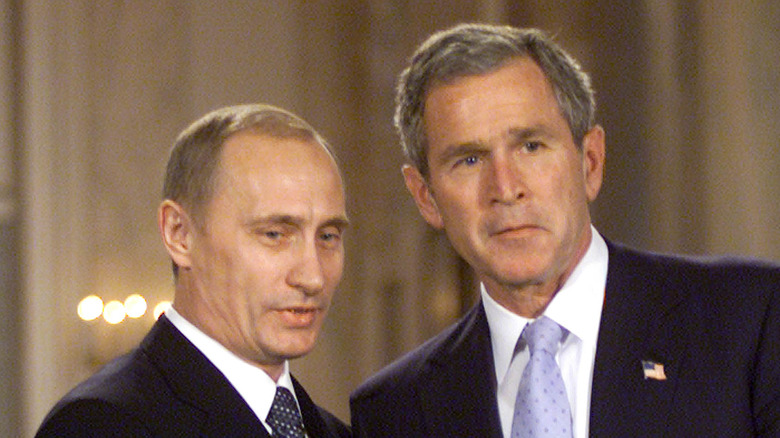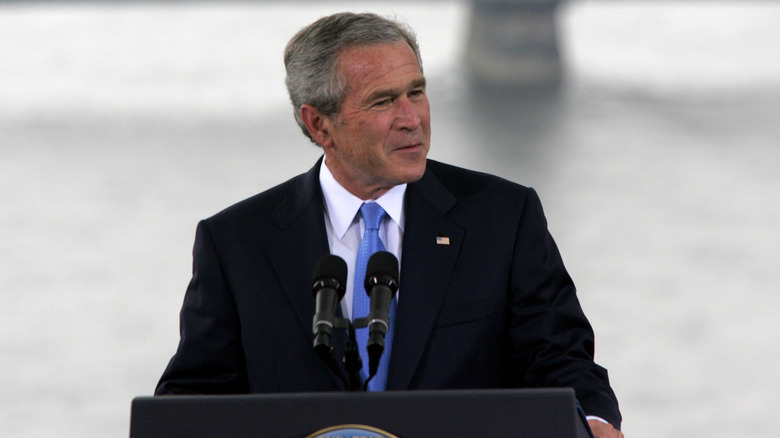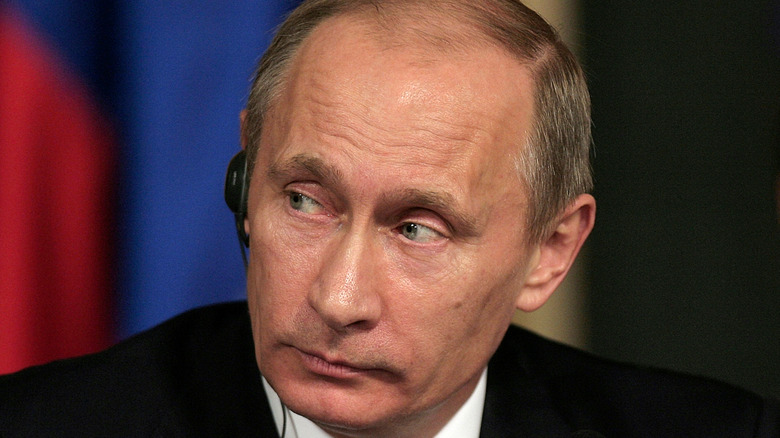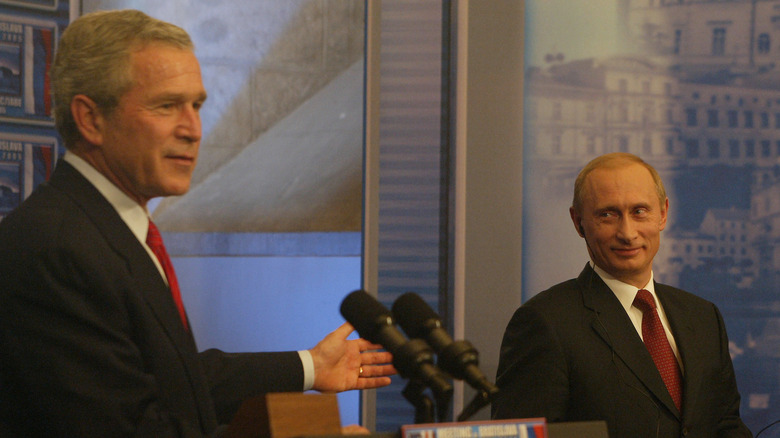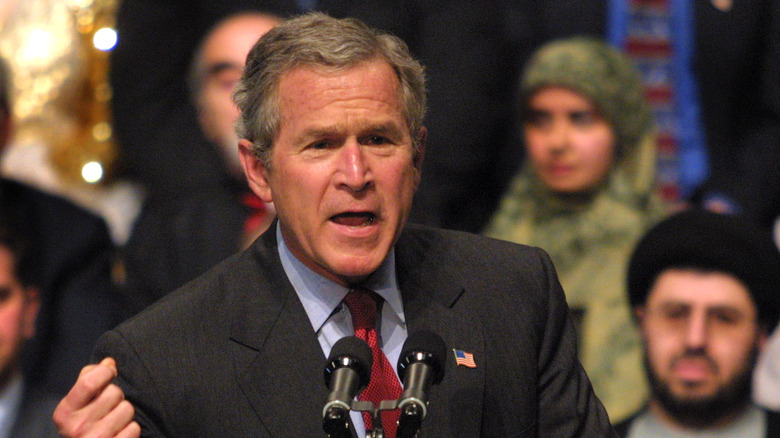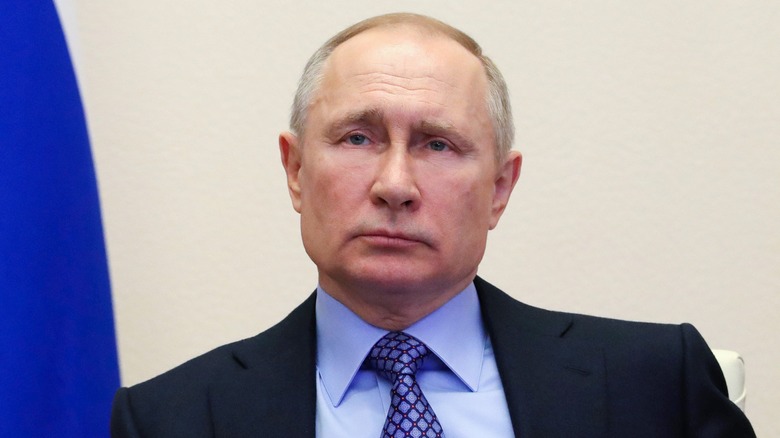Inside Vladimir Putin And George W. Bush's Relationship
In 2001, George W. Bush was elected the 43rd American President, per the official White House website. At that point, Vladimir Putin had been President of Russia for two years, appointed from his position as Prime Minister by the outgoing Russian President Boris Yeltsin (via Britannica). Since the fall of the Soviet Union in 1991, U.S. and Russian relations had improved, but remained unstable, according to History. It was the dawn of a new century, and that was the chessboard that both men found themselves faced with while leading two of the world's most powerful nations.
When the 9/11 terrorist attacks on the United States occurred, the global order was once more overturned. Post-9/11, the United States needed Russia in a whole new way. President Putin, on the other hand, had designs to return Russia to its former glory (per Foreign Policy). As history records, the relationship between the two leaders was sometimes tense, but often congenial. Without a doubt, this period in time marked a turning point in U.S.-Russian relations. The repercussions are still felt today.
Bush valued a working relationship with Putin
George W. Bush first met Russian President Vladimir Putin shortly after Bush took office in 2001, as Foreign Policy reports. Prior to that point, there's evidence Bush did not think highly of the foreign leader, calling him "One cold dude" (per Foreign Policy). Nevertheless, in the view of the Bush Administration, America needed Russia in a post-Cold War climate. After all, it seemed likely that sooner or later, both world powers would have to unite against China.
After the Twin Towers fell on 9/11, friendly relations between Russia and the United States took on more urgency. In turn, Bush invited the Russian leader to visit him at his Texas ranch and the U.S. presidential retreat at Camp David. Bush hoped Russia would be in his corner in the fight against terrorism, according to Brookings. Putin would not acquiesce so easily. The Bush administration, though, stayed focused on improved relations with Russia, even at the expense of other allies. Progress was made, but that small success would not be long-lasting.
Putin grew defensive
Per Human Rights Watch, the Russian government under Vladimir Putin is known for a number of human rights violations, and for suppressing any resistance to Putin's rule, often violently. In the aftermath of 9/11, and as George Bush entered his second term on a pledge to fight extremism everywhere, the Bush administration had to carefully navigate Russian-American relations, per Foreign Policy. How could America fight the war on terror, while it also appeased an aspiring autocrat?
For this reason, Bush stepped up his criticisms of Putin, and even though he tried to couch his words diplomatically, Putin did not appreciate the tone. After meeting with Putin on such topics, Bush found the foreign leader disagreeable. As Bush recalled later, "It went on and on ... at one point, the interpreter made me so mad that I nearly reached over the table and slapped the hell out of the guy. He had a mocking tone, making accusations about America. He was just sarcastic" (via Foreign Policy).
Bush tried to make up with Putin
A tense relationship between the United States and Russia would not stand, and so after the unsuccessful meeting with Putin, President Bush made an effort to smooth things over. That was especially true in the lead up to the G-8 summit, hosted in 2006 in St. Petersburg (via Brookings). Shifting his approach, Bush chose to speak less publicly about Russian human rights violations and Putin's gathering power, while leveraging vice president Dick Cheney to volley most of the barbs on those more sensitive subjects (per Foreign Policy).
These efforts to win Putin over were fruitless, despite all outward appearances. Bush did support Russia joining the World Trade Organization (WTO), which was also a goal of the Russian president. (Russia would finally join the WTO in 2011, per BBC). But in the aftermath of the 2006 G-8 summit, as well as further meetings, the two world leaders remained at loggerheads. Nowhere was this more evident than in the international response to the Iranian nuclear program.
Bush wanted former Russia Soviet republics to join NATO
By 2008. President Bush sought to allow former Soviet republics like Ukraine and Georgia into NATO, per Foreign Policy. This plan met with approval from Bush's own Vice President Cheney, but was cautioned against by other high-ranking members of his administration who feared it could anger Putin. For this reason, other close NATO allies of America, including France and Germany, also opposed it. Per The Guardian, Putin supported Russia itself joining NATO early on, but soon changed his opinion.
Tension over former Soviet republics joining NATO added fuel to the flame of Russia's 2022 military incursions in Ukraine (per Aljazeera). Some say it's overstated to lay Putin's motivations in Ukraine solely on the country's possible membership in NATO (via The Philadelphia Inquirer). Nevertheless, after the 2008 NATO summit in Bucharest in which it was agreed that Georgia and Ukraine would be allowed into NATO, Putin invited President Bush to visit him in Sochi, Russia. And because of the NATO question, among other factors, relations between Russia and Georgia remained fraught.
The sudden war in the Caucasus strained their relationship
In the view of several key members of the Bush administration, President Bush was not firm enough when he demanded that Putin take no military action against Georgia, as Foreign Policy reports. Around the same time as the 2008 Olympics in Beijing, Russia marched on Georgia — ostensibly to defend a breakaway region of the small country which sought to remain allied with Moscow. At this point, Putin's hand-picked successor, Dmitry Medvedev, was about to become president, and Putin was set to resume his role as Prime Minister. (Medvedev would cede power back to Putin in 2011, via Spiegel International.)
Nevertheless, war had broken out suddenly in Georgia, and the Bush administration thought more was to come from the Russian president whom Bush described as "cold-blooded" (via Foreign Policy). Thankfully, the Bush Administration listened to its advisors and refrained from American military intervention in Georgia. Instead President Bush sent his Secretary of State, Condoleeza Rice, to help broker peace. From that point on, Russia resisted NATO cooperation, and continued to support breakaway regions in former Soviet Republics sympathetic with Moscow. For an entire region of the world, the socio-political groundwork had been laid.
